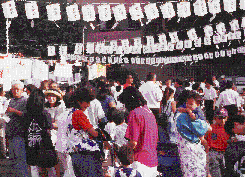ASIAN CALIFORNIA
Page 6 of 12
Japanese Americans:
A NEW SELF-IMAGE
 istorically, Japanese Americans have been the most
grossly persecuted of America's Asian groups. Perhaps as a direct result,
they have become the most assimilated, melting quite successfully into
the ethnic stew, and can be found in just about every professional,
entrepreneurial and social position. But the Japanese Americans of
the 21st century won't be the disenfranchised post-war apologists of the
past who hid their faces from the public eye. They will be firm in their
Japanese and American heritage.
istorically, Japanese Americans have been the most
grossly persecuted of America's Asian groups. Perhaps as a direct result,
they have become the most assimilated, melting quite successfully into
the ethnic stew, and can be found in just about every professional,
entrepreneurial and social position. But the Japanese Americans of
the 21st century won't be the disenfranchised post-war apologists of the
past who hid their faces from the public eye. They will be firm in their
Japanese and American heritage.
| "You are American Japanese because you were born in America. You would be Japanese American only if you were born in Japan, then went to America." |
Few Japanese opted for life in the cities. Instead bedroom communities like Gardena, southeast of Los Angeles, became the first Japanese American settlements. By 1920, Japanese farmers produced well over half of all the produce consumed in Los Angeles. Some accounts claim that 40% of the city's non-white population was then Japanese. Apparently the high numbers made enough politicians nervous. The Immigration Act of 1924 placed a very restrictive quota on further Japanese-born arrivals.
By 1940, two-thirds of the Japanese population was American-born. Most families had established small businesses for themselves, and the Japanese standard of living rose substantially.
Pearl Harbor and Executive Order 9066, which assigned 120,000 Japanese Americans to internment camps, changed all that. Communities were turned upside down. American venom unleashed itself on farmers and nurserymen, store owners and laborers. Thousands were forced to sell their land and their businesses at pennies on the dollar. They were given only three days to pack and board the train to prison.
At the war's end, many Japanese left America and the humiliating internment behind. Many who remained disavowed their heritage. California's former Japanese communities scattered themselves across the country, unwilling to regroup. Being too Japanese exposed them to America's underlying racism. The only solution was to blend in, to disappear within the cracks.
Bobby Toda understands the pervasive fear Japanese Americans had of raising too high a public profile.
"My parents, for example, were very much afraid of being too visible," he says. "They saw great virtue in keeping a low profile. It served them well, too. Back in the 1940s, it helped to be invisible, because it wasn't advantageous to be known as a Japanese American."

Japanese festivals help produce community solidarity. The community spirit has taken decades to rebuild after the World War II internment nightmare. |
A crucial part of reclaiming that firm Japanese American identity is to take part in the political process and be heard.
"When you consider the persecution of those earliest waves of Asian immigrants, it's not surprising that so many of them would become Democrats," says Toda. "The Democrats stood for the underprivileged and had a record of fighting for the disenfranchised. However, as young Japanese Americans become more established in the mainstream of society, you will see more independence where voting patterns are concerned. It won't be a given that because you're Japanese American you'll be a Democrat. Already, I'm seeing a lot more people either switching their party registration to Republican or just declaring themselves to be independents." Page 7
| Page 1 | 2 | 3 | 4 | 5 | 6 | 7 | 8 | 9 | 10 | 11 | 12 |
CONTACT US
|
ADVERTISING INFO
© 1996-2013 Asian Media Group Inc
No part of the contents of this site may be reproduced without prior written permission.
